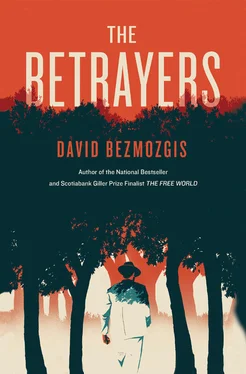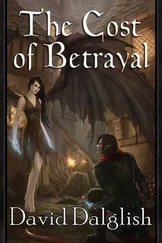One afternoon in the courthouse cafeteria, he had seen Chava alone.
— Why are you doing this thing, Chava?
— Because I looked objectively at the evidence, that’s why. And it confirmed my suspicions.
— What suspicions were those?
— That you were always a self-seeker. Here as there.
They had always been a fractious group. That wasn’t news. There had been plenty of rifts and conflicts in Moscow. There were nearly as many deviations in their ranks as there had been among the Marxists at the time of the revolution. Not to mention the purely personal rivalries and antagonisms. But one had to expect some strife. Dissidents were by nature contrary. They would find fault with Paradise and send God a petition.
And how had they been to one another afterward, in Israel? Decent, for the most part. Ideological differences, irrelevant in Israel, were shelved. But there was even more. People who had buckled under KGB detention were pardoned. If they appeared at gatherings, they were not shunned. Outsiders were surprised by this. But if you had been through that life, you found it easier, not harder, to forgive. You remembered your own bouts of despair. Who among them was made of steel? Very few. Sobel had had it very hard. He’d held out remarkably. And Kotler would grant that both Chava Margolis and Sasha Portnoy were tough. He’d spoken with people in a position to know and had read their books. He didn’t call their accounts into question as they did his. But others did the best they could. None of them was trained to undergo interrogations. At most, they had read Esenin-Volpin’s “Memo for Those Who Expect to Be Interrogated.” It counseled silence. But you could keep silent a week, two weeks, a month. Eventually you found yourself obliged to speak. Especially when the interrogator paraded facts before you, some of which were accurate. You knew that others were talking and you asked yourself what you would gain by keeping silent. Why, by your principled silence, should you incur the harshest sentence? Those were the rationalizations. Everyone entertained them. But this was the sad irony: Those who had succumbed were forgiven, and he who had endured was attacked. Attacked precisely because he had endured and was then celebrated for it. As if that too had been his doing. As if he’d been in a position to promote his own cause. As if he hadn’t been locked up like all the others. So what explained his fame, then? It certainly wasn’t his good looks. If he had attracted a disproportionate amount of the world’s attention, it was because of Miriam. Unlike Chava or Sasha or Shapira, he’d had a soulful, determined, striking young wife who went from embassy to embassy, from Hadassah to Hadassah, campaigning for his freedom. It wasn’t his fault that the world liked a love story.
Now he had betrayed Miriam and there was another scandal. How had he managed it? In one small life, to have so many scandals. But it was as though the first scandal had predisposed him to the others. If you have drawn the world’s attention once, it is easy to draw it twice. And easier still for some tawdry business. If you give the world a love story, it is like a first installment. Where the next installment is a hate story. Of which the world will accept an infinite number. He had Tankilevich to thank for his first scandal, his introduction to the world. He had Shapira’s spitefulness to thank for his second. For this one, he could thank himself.
Kotler looked at the man before him. Tankilevich smoldered. He who had every right to be angry wasn’t, and he who had no right was.
— Well, here we are, Chaim. However you believe we have been brought together, we have been brought together. What shall we make of this brief encounter?
— What is there to make of it?
— I don’t know. There was a time when I knew very well. In jail, especially in solitary confinement, I composed long speeches to you. Detailed, biting, and incontrovertible statements that would have reduced you to ash. If I’d preserved them all, they would have filled a library. I paced in my cell and recited them with the passion of Hamlet. What else did I have to do?
Kotler had composed speeches and letters and dialogues? Tankilevich thought. Well, he was not the only one. He thought he could have filled a library? Tankilevich didn’t doubt he could have matched him volume for volume. But he wasn’t going to bleat about it.
— I had a brother, Tankilevich said. What I did, I did only for his sake. To save his life. That is all. I had a younger brother who was a thief and a fool and I destroyed my life to save his.
— Destroyed whose life?
— Ah, Tankilevich said and brushed this off with a wave of his hand. You got thirteen years. All right, I am sorry for your thirteen years. But the way you were going, you must have expected it. And if they hadn’t used me to hang those years on you, they would have used someone else. But I got the same thirteen years and however many more.
Tankilevich could practically see the years, heaped one atop the other in a moldering pile. His brother had been arrested in 1964. So it was now forty-nine years since he had handed over the reins of his life. He had just turned twenty-one. His brother was two years younger. With his parents, he went to the KGB office in Alma-Ata to beg for clemency. And in the end, his parents offered him on the altar to save his brother. His mother wept and his father demanded. Somehow he found himself with his brother’s life in his hands.
— My brother smuggled eight molars’ worth of gold and they sentenced him to death. He was reckless and arrogant, but he was only eighteen, hardly more than a child. What was I to do, let them shoot him?
— So instead of him, me?
— They were never going to shoot you.
— The charge was treason, a capital crime, which came with a daub of iodine and a bullet to the head.
— What daub of iodine?
— To guard against infection, Kotler said with a grin.
— Before you, Portnoy and Baskin were convicted of treason, and their sentences were commuted. The Soviets weren’t killing dissidents anymore. It wasn’t like under Stalin. Or under Khrushchev. Under Khrushchev they were killing people like my brother. Everyone knew it. They were shooting them or, worse, sending them to perish in the uranium mines.
— So what was the deal you made?
— I agreed to work for them. In exchange, they reduced my brother’s sentence to ten years. He served eight and then went to bestride the world. While I sat in my Ukrainian village, he had Israel and America and Europe and even the New Russia. He traded, he did business, he had four wives, six children, and God knows what else. He lived like a king until some Moscow gangster put a bullet through his heart.
For that Tankilevich had forfeited his life. Though it would have been ludicrous to expect that his brother would recast himself as a scholar or a healer. His brother was a swindler, and Tankilevich had merely granted him the chance to live long enough to see the USSR remade in his image. In recompense, Tankilevich had received souvenirs and postcards, a few phone calls, fewer visits. But when they moved from the village to Yalta, when the KGB assistance dried up and he and Svetlana were reduced to living off their meager pensions, his brother had sent money. He hadn’t stinted. What he sent was enough for them to buy the house and the car. And for as long as his brother lived, he had continued to send. A small fraction of his many millions, to be sure, but Tankilevich didn’t fault him. Though when he was killed, the millions mysteriously evaporated. There wasn’t even enough for Tankilevich to fly to Moscow and attend the funeral. Strangers buried his brother.
Читать дальше












